|
February 19, 2020
All
Out to Support Ontario Province-Wide
Strike of Education Workers
Make
Your Mark on the Province-Wide Strike of Education Workers!
Wear Red on Friday!
- Laura
Chesnik -

• The Fight of Educators for Their Working
Conditions Has Established a New Standard - Enver
Villamizar
• The Challenges Ahead
- Mira Katz
• Ontario Day of Action
in Solidarity with Striking Teachers - Students
Say No
• Windsor Community Forum
on E-Learning
For Your
Information
• Ontario
Education Unions Speak Out at Pre-Budget Consultations
All Out to Support Ontario
Province-Wide Strike of Education Workers
- Laura Chesnik -
 On Friday, February 21, nearly
200,000 Ontario teachers and
education workers across 72 school boards and nearly 5,000 schools will
carry out a joint action to say No!
to the government's attempts to
dictate measures that attack their working conditions, which are
students' learning conditions. The teachers and education workers will
engage in a one-day walkout across Ontario. They are all members of the
Association des enseignantes et des enseignants franco-ontariens
(AEFO), the Elementary Teachers' Federation of Ontario (ETFO), the
Ontario English Catholic Teachers' Association (OECTA) and the Ontario
Secondary School Teachers' Federation (OSSTF). On Friday, February 21, nearly
200,000 Ontario teachers and
education workers across 72 school boards and nearly 5,000 schools will
carry out a joint action to say No!
to the government's attempts to
dictate measures that attack their working conditions, which are
students' learning conditions. The teachers and education workers will
engage in a one-day walkout across Ontario. They are all members of the
Association des enseignantes et des enseignants franco-ontariens
(AEFO), the Elementary Teachers' Federation of Ontario (ETFO), the
Ontario English Catholic Teachers' Association (OECTA) and the Ontario
Secondary School Teachers' Federation (OSSTF).
The Ford government has lost the battle for public
opinion in its
attempts to attack all social programs by targeting education workers.
It is nonetheless preparing to release a budget that it hopes to use in
a new
effort to bolster its claim that it must take funds from social
programs and use them to pay the rich in the form of debt and deficit
repayments
and new transportation infrastructure. It is once again repeating the
self-serving view that education is a cost and that only by limiting
increases in wages can even the existing standards in education be
maintained, never mind improved, which is what is required.
In November 2019 the government passed Bill 124, Protecting
a Sustainable Public Sector for Future Generations Act to
try to dictate parameters for the negotiations with all public sector
workers in the form of a one per cent limit on new compensation. This
is an attack on all working people as the government is trying to paint
those
who create the value through their work as a cost and a drain on the
economy that must be attacked through legislation, while the entire
public purse is put at the disposal of paying the rich.
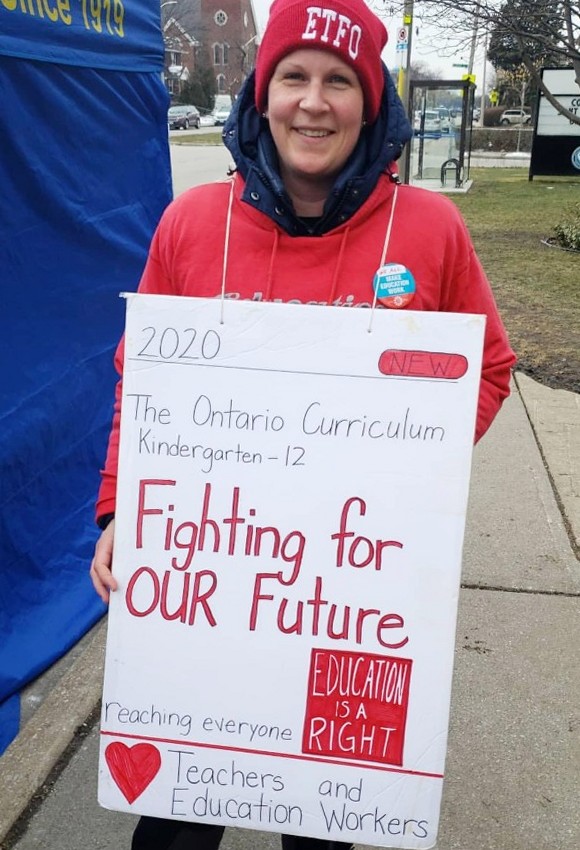 In 2018-19 the
Ontario government paid out $12.4 billion to the
moneylenders in the form of interest alone on the provincial debt.
Instead of developing public revenue and recouping from the rich the
value created by public services which they consume, the Ford
government has instead set out to attack the workers and the youth. In
this
respect, the joint actions of educators are in fact expressing the
conscience of the working class of Ontario that they are not a cost but
those who create the value in the economy and have a right to decide
how it is used. In 2018-19 the
Ontario government paid out $12.4 billion to the
moneylenders in the form of interest alone on the provincial debt.
Instead of developing public revenue and recouping from the rich the
value created by public services which they consume, the Ford
government has instead set out to attack the workers and the youth. In
this
respect, the joint actions of educators are in fact expressing the
conscience of the working class of Ontario that they are not a cost but
those who create the value in the economy and have a right to decide
how it is used.
All working people in the province, irrespective
of whether they
work in education or not, are called on to put their mark on February
21 in defence of the rights of teachers and education workers. This
will express the conscience of Ontarians in defence of the right to
education and the right of working people to have a say over the
direction
of the economy and in particular the public services and social
programs we all depend on. Wear red on Friday, February 21 wherever you
are as a way to join in this fight for your empowerment! Join the
picket lines if you can, and show that the working people of Ontario
stand as one!
Education Is a Right!
Workers Are Not a Cost of Production!
Who Decides? We Decide!
Empower Yourself Now!

- Enver Villamizar -
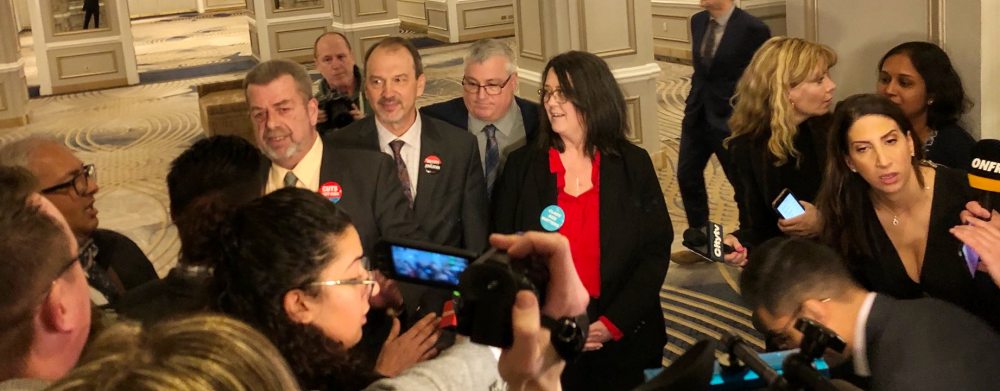
Presidents of the four Ontario education unions hold joint press
conference following Education Minister Stephen Lecce's
speech at the
Canadian Club, February 12, 2020.
The joint February 21 walkout called by four
Ontario education
unions is the result of education workers steadfastly overcoming the
attempts to divide their ranks. Since 2012, when the Ontario Liberal
government led by Dalton McGuinty deliberately set out to use one union
against the others, a very open split was created among the leaderships
of the
various education unions. This approach has been used by successive
governments to get one of the unions in education to agree to a general
framework for a province-wide collective agreement that it can then
impose on the others, despite the different working conditions and
realities that exist across the province and across school boards.
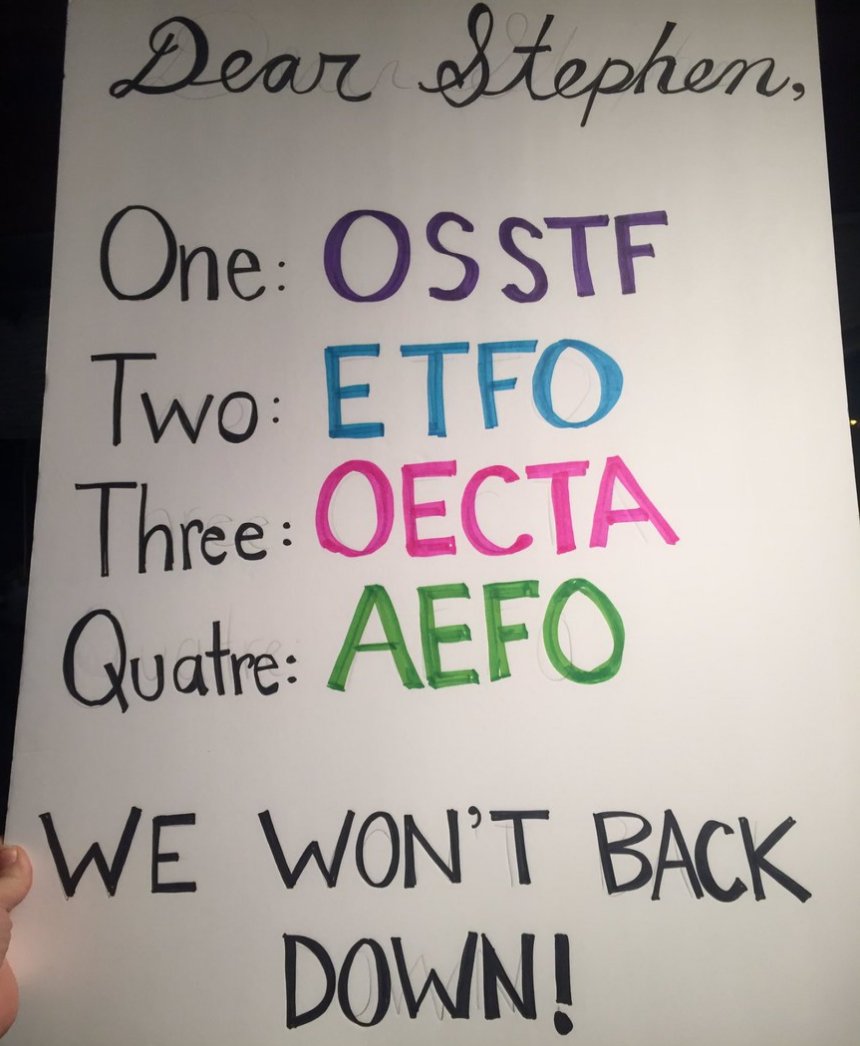 The
Wynne Liberal government then imposed provincial bargaining that
further exacerbated the situation by legislating the elimination of
much local decision-making over negotiations. The combination of the
divide-and-rule methods and the elimination of local decision-making
was aimed at eliminating the ability of the mass of teachers and
education workers across the province to express their determination to
improve the education system rather than accept its deterioration in
the name of maintaining the status quo. The
Wynne Liberal government then imposed provincial bargaining that
further exacerbated the situation by legislating the elimination of
much local decision-making over negotiations. The combination of the
divide-and-rule methods and the elimination of local decision-making
was aimed at eliminating the ability of the mass of teachers and
education workers across the province to express their determination to
improve the education system rather than accept its deterioration in
the name of maintaining the status quo.
Since 2012, but even more so since March 2019,
concerted efforts have been made at the grassroots level to overcome
the divisions on the basis that education is a right and that
irrespective of which board one works at or which job class one holds,
educators are one in defence of the right to education and their right
to decide their wages
and working conditions. This has included the call to elect a teacher
as an independent candidate as a way to speak for yourself and empower
yourself now, the formation of joint organizing groups on social media
where all educators, irrespective of union affiliation, can join and
inform one another about what is taking place and plan actions
together. It has also included the establishment of forms of media such
as the Education is a Right podcast in which educators across unions
discuss together the problems in education and what can be done to
solve them.
This ongoing work at the grassroots level resulted
in
new standards of unity once the strikes of education workers began in
October 2019 with the Canadian Union of Public Employees' (CUPE)
work-to-rule actions. Despite CUPE being the first to sign a contract
with the government, which the government hoped could be used to show
that
workers accept its dictated one percent limit on new compensation, this
did not divide educators. In fact, it re-affirmed the need for united
actions. During the CUPE negotiations educators began to see each
other's actions as their own and expressed this in many ways such as
school staff wearing the same colours across unions, giving cards, food
and other gifts to make it clear that everyone was in the same fight.
 Once
rotating strikes of the unions representing teachers and education
workers began, this was elevated to new levels. What started as
rotating strikes of each union have become almost daily strikes of the
mass of education workers who see each other's actions as their own.
Examples abound from across the province of the unity in the
workplace amongst members of all unions. When one union was out on a
rotating strike, those not out joined their lines, bringing food and
other support at lunch time or before and after school to show that
they are united. In some cases when strikes of different unions took
place on the same day, picket lines have been merged and infrastructure
such as tents and sound systems shared. In one example, to show support
for their striking support staff, all other staff and administration at
a school pooled donations to "adopt" their striking colleagues for the
day, matching the strike pay they received from their union. These
actions express the sentiment of education workers that this is one
fight
and that they will not be divided. In sum, what is taking place on
February 21 is a reflection of what teachers and educators have wanted,
especially since 2012, which is a united front to affirm the rights of
all education workers. Once
rotating strikes of the unions representing teachers and education
workers began, this was elevated to new levels. What started as
rotating strikes of each union have become almost daily strikes of the
mass of education workers who see each other's actions as their own.
Examples abound from across the province of the unity in the
workplace amongst members of all unions. When one union was out on a
rotating strike, those not out joined their lines, bringing food and
other support at lunch time or before and after school to show that
they are united. In some cases when strikes of different unions took
place on the same day, picket lines have been merged and infrastructure
such as tents and sound systems shared. In one example, to show support
for their striking support staff, all other staff and administration at
a school pooled donations to "adopt" their striking colleagues for the
day, matching the strike pay they received from their union. These
actions express the sentiment of education workers that this is one
fight
and that they will not be divided. In sum, what is taking place on
February 21 is a reflection of what teachers and educators have wanted,
especially since 2012, which is a united front to affirm the rights of
all education workers.
Irrespective of what may happen now in the
negotiations,
a new standard has been established that will not be forgotten and
bodes well for the future. It is this unity in action that the ruling
class fears most. It will no doubt double down now to try and impose
new divisions or, failing that, use force in the form of back-to-work
legislation.
Regardless of what the government tries, this unity in action has set a
new standard and will guide education workers into the difficult
battles ahead.
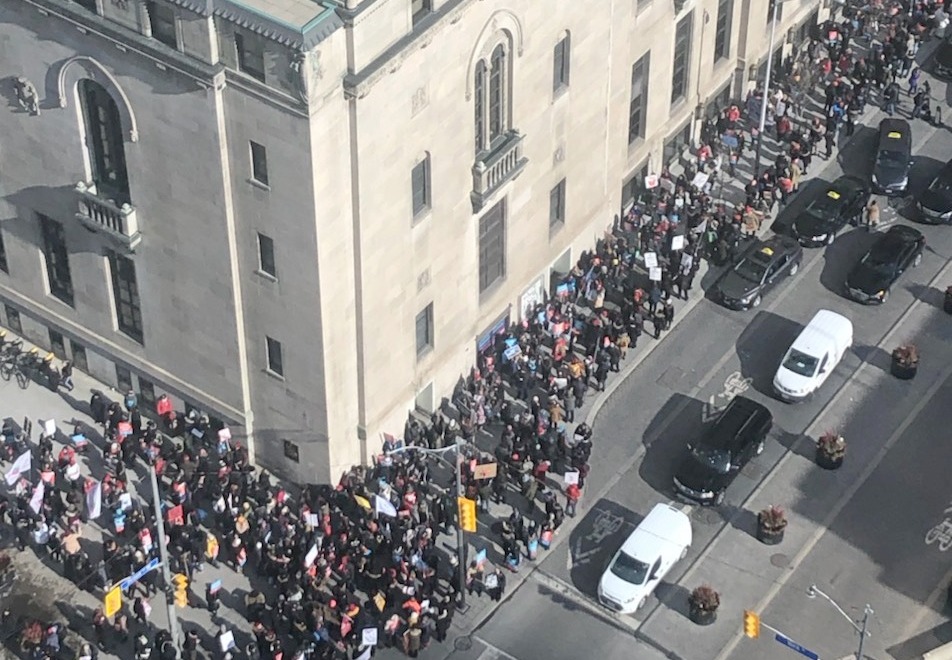
Education workers picket Education Minister Lecce's speech to the
Canadian Club, Toronto, February 12, 2020.

- Mira Katz -
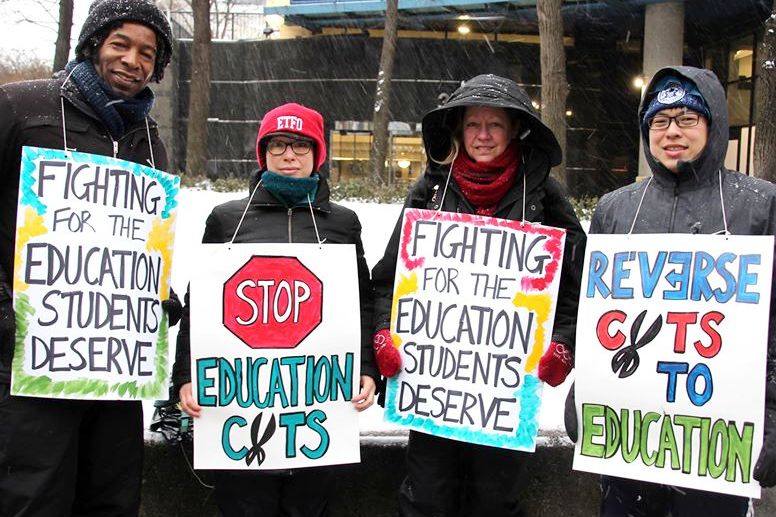 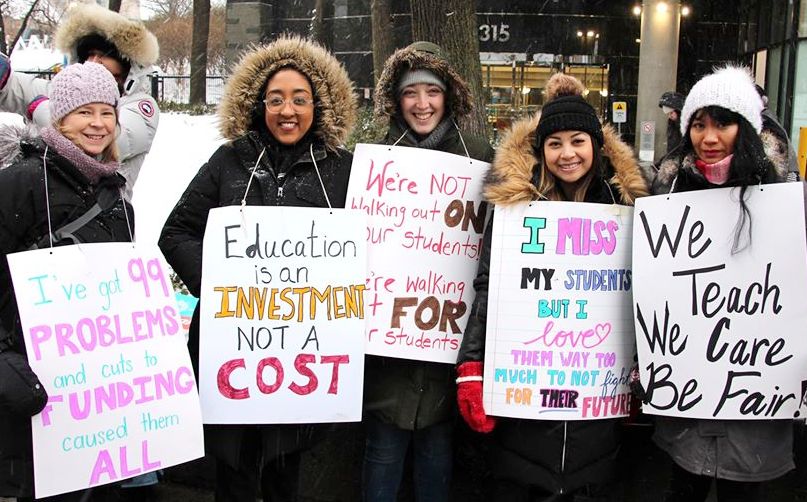
The ruling class in Ontario continuously seeks to
create conditions
to criminalize the teachers and education workers by blaming them for
the problems parents and students encounter with the education system.
It also tries to break the unity in action of Ontario teachers and
education workers. Like its stand towards the Indigenous peoples'
firm No! to others deciding what happens on their
lands, the
ruling class will not permit any power other than its own to assert its
right to decide what happens in favour of private interests. When faced
with political differences and a united opposition of the people, it
resorts to threats and dictate rather than negotiations and political
solutions that could harmonize the individual and collective interests
in a manner that provides a path forward.
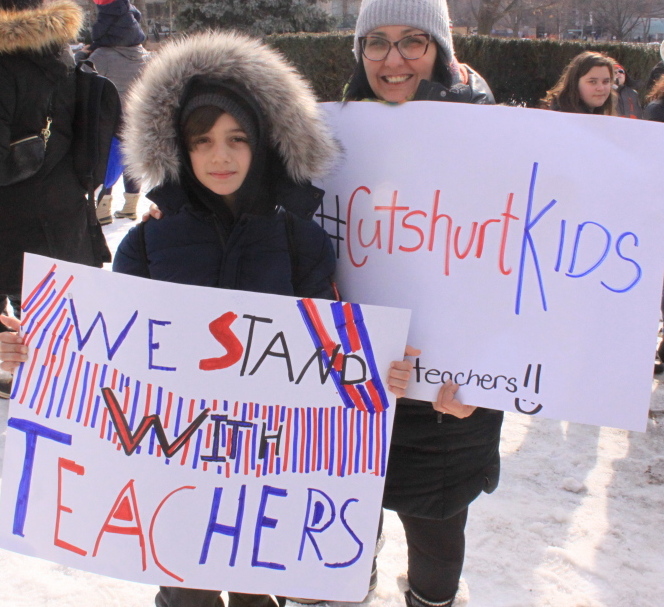 A recent
editorial in the National Post entitled
"Time to End Teachers' Right to Strike" directly called for the Ontario
government to eliminate educators' right to strike through legislation.
The article expresses the frustration of the ruling class with teachers
and education workers who refuse to accept attacks on their working
conditions
that they have firmly established are students' learning conditions: A recent
editorial in the National Post entitled
"Time to End Teachers' Right to Strike" directly called for the Ontario
government to eliminate educators' right to strike through legislation.
The article expresses the frustration of the ruling class with teachers
and education workers who refuse to accept attacks on their working
conditions
that they have firmly established are students' learning conditions:
"Every government of any stripe over the past 30
years has suffered
their censure for allegedly failing to appreciate, accommodate and
compensate their members to the degree they feel is their due. Liberal,
Conservative, New Democrat, no matter, it's always the same: some issue
arises that union bosses condemn as an insult to their
profession, an attack on students and a mortal threat to the future of
education."
Instead of recognizing that they must invest in
public education on
an ongoing and constant basis and recoup these investments from the
rich who benefit, the ruling class cannot fathom why, despite trying to
divide and rule over teachers and educator workers and their unions,
they will not willingly submit to the neo-liberal program of cutting
and restructuring education to pay the rich through privatization and
other schemes.
The article then resorts to slanders, insinuating
that educators are
sheep being forced to follow the dictates of "union bosses" for fear of
retribution:
"Teachers themselves may be dedicated
professionals with deep
concern for students and respect for learning, but they have long since
ceded contract authority to their unions. Requests to authorize
walkouts over whatever issue is currently deemed intolerable are
overwhelmingly approved. Those who may hold personal doubts know better
than
to challenge the powers that be."
 This
comes at the same time as the Ontario government used its majority to
try and eliminate university and college student unions because it felt
they were led by "crazy Marxists." The ruling class cannot fathom that
the teachers and education workers themselves are in fact the ones who
have fought to ensure that their unions do not accept
the degradation of their working conditions or secret deals that divide
the movement as a whole. This was the case in 2014, for example, when
the Ontario Liberals imposed contracts on education workers through
legislation then got one of the education union presidents to run as
their candidate in a by-election after cutting a deal with the
government that was said to be "the best that could be done" under the
circumstances. The union's own members went out of their way to ensure
that the president was held to account along with the entire Liberal
minority government that was propped up by the Progressive
Conservatives at the time, bringing it to its knees in that by-election. This
comes at the same time as the Ontario government used its majority to
try and eliminate university and college student unions because it felt
they were led by "crazy Marxists." The ruling class cannot fathom that
the teachers and education workers themselves are in fact the ones who
have fought to ensure that their unions do not accept
the degradation of their working conditions or secret deals that divide
the movement as a whole. This was the case in 2014, for example, when
the Ontario Liberals imposed contracts on education workers through
legislation then got one of the education union presidents to run as
their candidate in a by-election after cutting a deal with the
government that was said to be "the best that could be done" under the
circumstances. The union's own members went out of their way to ensure
that the president was held to account along with the entire Liberal
minority government that was propped up by the Progressive
Conservatives at the time, bringing it to its knees in that by-election.
The fact that calls are being given to eliminate
the right to strike
of education workers clearly shows that the ruling class does not want
to negotiate and has not learned from its mistakes. Instead, it wants
the Ford government to be the instrument of making dictate permanent by
eliminating the right to strike. This must be firmly opposed by all
working people by standing with educators in their strike actions to
show that anything other than a negotiated resolution will not be
accepted.

- Students Say No -
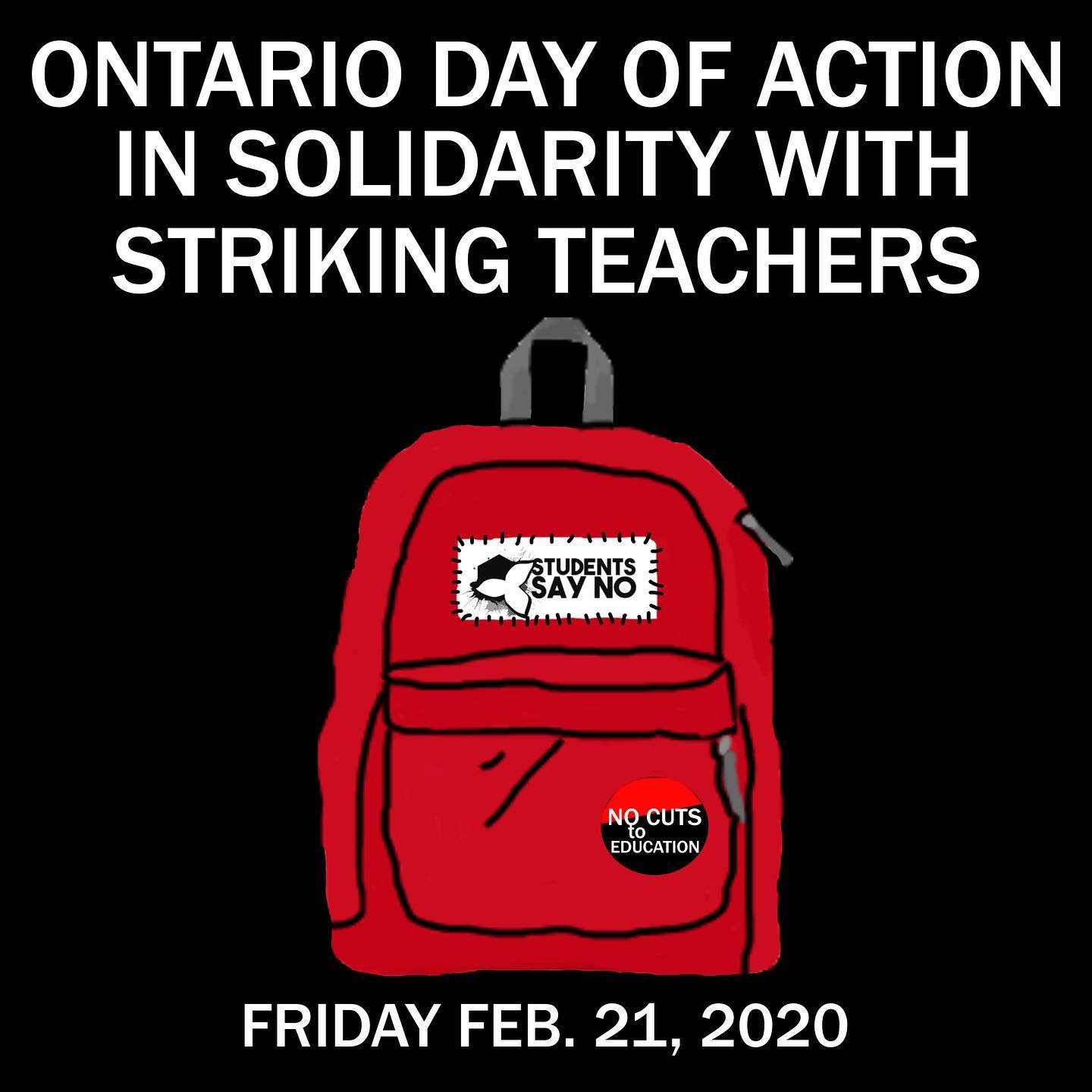 For the past
couple of months, teachers and education staff across the
province have been taking action against the budget cuts made by Ford's
government. As students, we have seen our teachers and education staff
brave the cold and make all of our voices heard through resilient
rallying and collective action. Despite the job actions taken,
negotiations have still yet to be made, and Stephen Lecce, the
Provincial Minister of Education, has yet to even show up to the
bargaining table. We have seen and felt the effects of these cuts and
can no longer be complacent in the fight for our education. For the past
couple of months, teachers and education staff across the
province have been taking action against the budget cuts made by Ford's
government. As students, we have seen our teachers and education staff
brave the cold and make all of our voices heard through resilient
rallying and collective action. Despite the job actions taken,
negotiations have still yet to be made, and Stephen Lecce, the
Provincial Minister of Education, has yet to even show up to the
bargaining table. We have seen and felt the effects of these cuts and
can no longer be complacent in the fight for our education.
That's why this Friday, February 21, we will be
having
a province-wide Day of Action to unify us as students and stand in
solidarity with our teachers and education staff striking. The team at
Students Say No has created an Organizer's Guide [click
here] for you all to learn
about what action you can take in your community and how we can make a
huge impact this Friday! Make sure to register your school in our
Registration Form [click
here] so we can keep track of all the student actions
taking place on this day.
As students, we HAVE to stand up for our
education, for
our teachers and staff, for our futures and for each other. We can no
longer stand by while the government attempts to strip away quality
public education. So this Friday, get your friends together and FIGHT
BACK! Dance, make art, chant and refuse to back down! Let's get
organized!
#studentssayno #cutshurtkids #prioritizeeducation
#nocutstoeducation
For more information, click
here.
 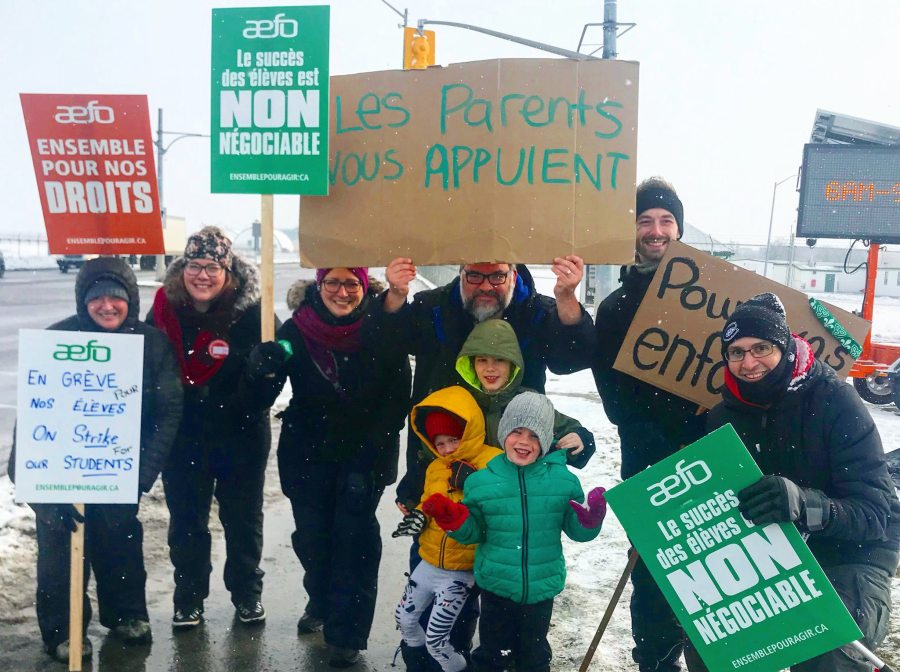
Students participate in OSSTF rotating strike day and AEFO
province-wide strike,
February 13, 2020.

Community
Forum on E-Learning
Saturday,
February 29 -- 2:00 pm - 4:00 pm
Downtown Windsor Business Accelerator
1501 Howard Avenue, Windsor
Facebook
Teachers for Global Awareness -- Social Justice
Forum
and Education is a Right Podcast are hosting a panel discussion on the
Ontario government's plan to make taking E-learning courses a mandatory
requirement for graduation from secondary school. The keynote address,
"The Impossible Promise of e-Learning," will be given by Beyhan
Farhadi, Ph.D., whose research examined the relationship between
e-Learning & educational inequality in the Toronto District
School
Board. Panelists will include a student, an e-learning teacher,
Michigan educator and more.

Click to enlarge

For
Your Information
Ontario education unions participated in the
Ontario
2020 pre-budget consultations to speak out against the seriousness of
cuts to public education funding being implemented over the next few
years, which, if not reversed, will seriously impact the quality of
education in Ontario. They rejected government misrepresentation of the
province's
finances and spoke of the negative impact cuts to funding of social
programs are having, not just for education, but for the most
vulnerable across the board.
Below are extracts from submissions by three
education unions to Ontario's 2020 pre-budget consultations:
Ontario Secondary School Teachers Federation
(OSSTF)
OSSTF represents more than 60,000 members,
including
teachers and over 15,000 education workers including educational
assistants, child and youth workers, early childhood educators,
psychologists, secretaries, speech-language pathologists, social
workers, plant support personnel, and many others employed in Ontario's
elementary and secondary English and French language schools, as well
as the university sector.
The introduction to the OSSTF brief points out:
"The Financial Accountability Office of Ontario
(FAO)
released a report on September 26, 2019, detailing the alarming fact
that the projected growth in Ministry of Education spending was well
below education cost drivers (school-age population and inflation) over
the next four years. This means that compared to the 2018-2019 school
year,
despite an overall increase in funding available to school boards,
there will be significantly less per pupil funding, compared to
previous years, to provide a high quality education to the growing
population. In fact, according to the government memo (2019: B14), per
pupil funding is already down $54 per student in the first year of a
multi-year
plan of significant cuts."
"Beyond education" the OSSTF points out that
"overall
program spending in Ontario is already dead last in Canada" and adds
that "the FAO calculated that program spending will be cut a further 10
per cent over the next five years to pay for tax cuts that have yet to
be announced. At the same time, the Ontario government collects the
lowest
total revenue per person. This combination is placing a severe strain
on programs in Ontario and will no doubt have a negative impact on
education outcomes for students, in turn weakening Ontario's workforce
and, ultimately, our economy."[1]
Elementary Teachers Federation of Ontario (ETFO)
ETFO has approximately 76,000 members, 73 per cent
of
whom are teachers, 26 per cent occasional teachers and the remainder
are professional support or educational support personnel, designated
early childhood educators, etc.
In its brief submitted on January 23, EFTO said
the government has relied on a narrative of inflated deficits to
justify deep cuts to public spending and called out the government's
claim that the provincial deficit inherited from the previous
government stood at $15 billion (subsequently revised to $14.5 billion).[2], The reality is
that Ontario spends less per-capita on public programs than any other
province or territory in Canada. Furthermore, the FAO review of
provincial finances found the provincial deficit for 2018-19 was closer
to $7.4 billion, roughly half of what the government claimed.
EFTO also stated that "the government has chosen
to
demonize educators and the organizations that represent them, and
trample on their right to free and fair collective bargaining
guaranteed under the Canadian
Charter of Rights and Freedoms. The
unilateral imposition of limits to compensation introduced outside of
the collective bargaining
process by the adoption of Bill 124, has shown Ontarians that the
government does not respect the rights of workers, and that it is not
interested in good faith negotiations."
Ontario English Catholic Teachers' Association
(OECTA)
OECTA represents 45,000 teachers employed by Ontario's
English Catholic school boards. They teach on a full-time, part-time,
or occasional basis in elementary and secondary schools, or in
continuing education programs.
OECTA pointedly stated in its brief that the
government
is "misleading Ontarians by wildly inflating the provincial deficit."
OECTA stated: "The hallmarks of the government's approach -- fiscal
austerity, haphazard decision making, and false or misleading
statements to the public -- have been nowhere more apparent than in
education."
"The government regularly claims it has made a
$700
million investment in education this year," OECTA states. "But nearly
$690 million of this is for the so-called attrition protection fund,
which is a short-term solution meant to mask the loss of teaching
positions that would result from the government's planned class size
increases and mandatory e-learning regime over the next four years,
until the next election [...]"
"The truth is that the core per-pupil funding
grant for
elementary and secondary education has been cut by more the $600
million. In addition, funding for programs and supports for vulnerable
students has been cut by $230 million [...]"
"It is simply not possible to reduce spending in
education, health, social services, and other areas without negatively
affecting the well-being of individuals and families [...] While we
recognize the government's ideological preferences, we will continue to
point out that their mandate and responsibility is to ensure the
long-term health and prosperity of all Ontarians."[3]
Notes
1. OSSTF
brief
2. ETFO
brief
3. OECTA
brief

(To access articles
individually click on the black headline.)
PDF
PREVIOUS
ISSUES | HOME
Website:
www.cpcml.ca
Email: office@cpcml.ca
|

